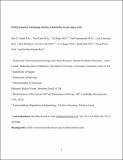EZH2 promotes a bi-lineage identity in basal-like breast cancer cells
Author(s)
Granit, R. Z.; Gabai, Y.; Hadar, T.; Karamansha, Y.; Liberman, Leslie D.; Waldhorn, I.; Maly, B.; Darash-Yahana, M.; Peretz, T.; Ben-Porath, Ittai; Regev, Aviv; Gat-Viks, Irit; ... Show more Show less
DownloadGranit.pdf (1.580Mb)
OPEN_ACCESS_POLICY
Open Access Policy
Creative Commons Attribution-Noncommercial-Share Alike
Terms of use
Metadata
Show full item recordAbstract
The mechanisms regulating breast cancer differentiation state are poorly understood. Of particular interest are molecular regulators controlling the highly aggressive and poorly differentiated traits of basal-like breast carcinomas. Here we show that the Polycomb factor EZH2 maintains the differentiation state of basal-like breast cancer cells, and promotes the expression of progenitor-associated and basal-lineage genes. Specifically, EZH2 regulates the composition of basal-like breast cancer cell populations by promoting a ‘bi-lineage’ differentiation state, in which cells co-express basal- and luminal-lineage markers. We show that human basal-like breast cancers contain a subpopulation of bi-lineage cells, and that EZH2-deficient cells give rise to tumors with a decreased proportion of such cells. Bi-lineage cells express genes that are active in normal luminal progenitors, and possess increased colony-formation capacity, consistent with a primitive differentiation state. We found that GATA3, a driver of luminal differentiation, performs a function opposite to EZH2, acting to suppress bi-lineage identity and luminal-progenitor gene expression. GATA3 levels increase upon EZH2 silencing, mediating a decrease in bi-lineage cell numbers. Our findings reveal a novel role for EZH2 in controlling basal-like breast cancer differentiation state and intra-tumoral cell composition.
Date issued
2012-09Department
Massachusetts Institute of Technology. Department of BiologyJournal
Oncogene
Publisher
Nature Publishing Group
Citation
Granit, R Z, Y Gabai, T Hadar, Y Karamansha, L Liberman, I Waldhorn, I Gat-Viks, et al. “EZH2 promotes a bi-lineage identity in basal-like breast cancer cells.” Oncogene 32, no. 33 (September 17, 2012): 3886-3895.
Version: Author's final manuscript
ISSN
0950-9232
1476-5594